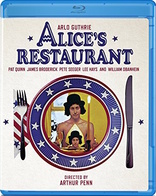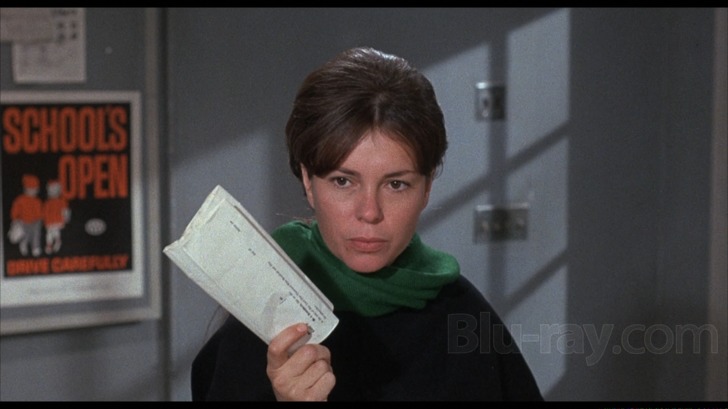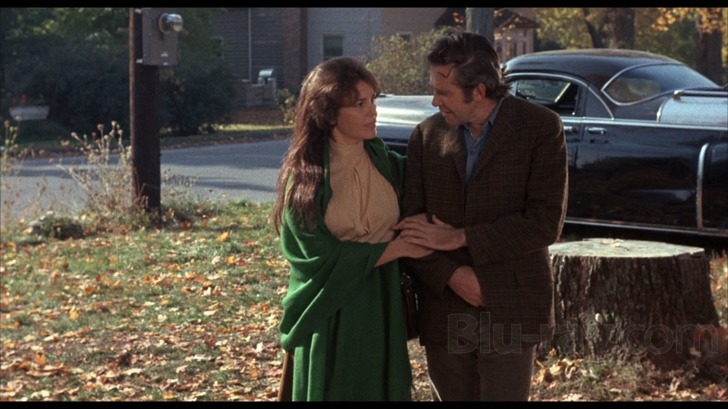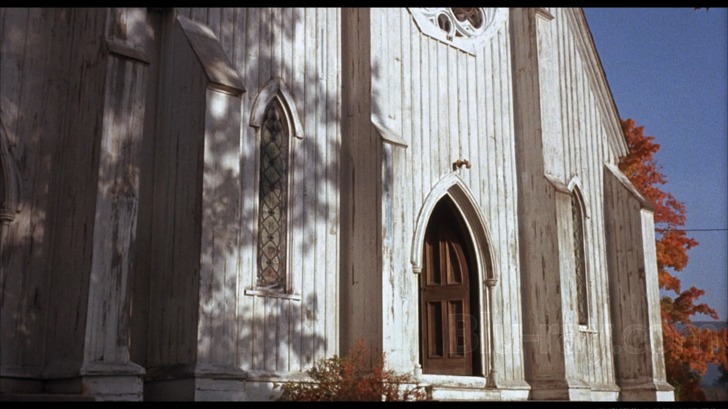Alice's Restaurant Blu-ray Movie
HomeAlice's Restaurant Blu-ray Movie 
Olive Films | 1969 | 111 min | Rated R | Mar 31, 2015
Movie rating
6.6 | / 10 |
Blu-ray rating
| Users | 0.0 | |
| Reviewer | 3.0 | |
| Overall | 3.0 |
Overview
Alice's Restaurant (1969)
A cinematic adaption of Arlo Guthrie's classic song story.
Starring: Arlo Guthrie, Patricia Quinn (II), James Broderick, Pete Seeger, Lee HaysDirector: Arthur Penn
| Drama | Insignificant |
| Comedy | Insignificant |
Specifications
Video
Video codec: MPEG-4 AVC
Video resolution: 1080p
Aspect ratio: 1.85:1
Original aspect ratio: 1.85:1
Audio
English: DTS-HD Master Audio 2.0
Subtitles
None
Discs
25GB Blu-ray Disc
Single disc (1 BD)
Playback
Region A (B, C untested)
Review
Rating summary
| Movie | 3.0 | |
| Video | 3.5 | |
| Audio | 4.0 | |
| Extras | 0.5 | |
| Overall | 3.0 |
Alice's Restaurant Blu-ray Movie Review
Maybe you should be a litterbug after all.
Reviewed by Jeffrey Kauffman March 30, 2015There are two long form ballads (in the traditional sense of a story told through song, not merely a “slow tune") that have entered the public lexicon in perhaps unexpected ways, though ironically only in dribs and drabs. Ask any random person to repeat a salient section of either Don McLean’s “American Pie” or Arlo Guthrie’s “Alice’s Restaurant Massacree,” and chances are you’ll get only a smattering from either tune’s chorus. “Bye, bye, Miss American Pie, I drove my Chevy to the levy but the levy was dry” tends to be the most memorable line from McLean’s account of “the day the music died,” but perhaps even more of a redaction tends to take place with Guthrie’s paean to sixties’ counterculture, probably due to the fact that the “song” was in fact largely a spoken monologue, with bookending sung moments that provided what has become the ineluctable element from that tune, namely “You can get anything you want at Alice’s Restaurant.” Those who can recall and/or recount more than the chorus of Guthrie's anthem will know that while amusingly discursive, the upshot is that a relatively minor littering offense Arlo committed (and fessed up to, once accosted) ultimately offered the "long haired hippie freak" (to utilize the common parlance of the day) an "out" to keep from being drafted. Wrapped up and around this convoluted tale are a grab bag of eccentric characters. Arthur Penn's film of Alice's Restaurant utilizes the song's narrative as the template for a probably somewhat padded plot. Guthrie more or less plays himself, with a variety of interesting character actors (including Matthew Broderick's father, James) filling the supporting roles. The film is decidedly whimsical, but there's also a rather melancholic subtext running through it, as if Penn knew that the era of Flower Power and the Summer of Love was quickly coming to an ignominious close.

While Guthrie’s original tune was rather epic sized, at least for the confines of Top 40 radio, which (in the inimitable words of one William Joel) tends to like to “cut things down to 3:05.” But even an eighteen (plus) minute song probably can’t provide quite enough fodder for a feature length film, and that’s obviously why Alice’s Restaurant tends to troll in rather wide waters in order to provide enough material. The “punch line” of the song, namely that Arlo’s bout with the litterbug unintentionally brands him a criminal, meaning he can’t be drafted for the Vietnam War, is front and center in this film from the get go, with Arlo traipsing off rather unexpectedly to Montana of all places to go to college, in the hopes that that will give him a deferment from the call of Uncle Sam.
In one of a handful of scenes showing Guthrie’s charmingly lackadaisical reactions, his tenure at the college is short-lived due to his inability to adapt his round pegness into what is obviously a very square hole. This comes to a head in a music class, appropriately enough, where Arlo’s penchant to jam doesn’t sit right with a teacher trying to get a gaggle of kids to play Brahms on Wurlitzer electric pianos. That, along with what was then the oft repeated barbs lobbed at Guthrie by the locals for being one of those “long haired hippie freaks,” convinces the young man that the more urban enclaves of the East Coast might be more to his liking.
It’s there that Arlo reunites with Ray (James Broderick) and Alice Brock (Pat Quinn), a couple who have transformed an old country church into a commune of sorts which supports an eccentric coterie of hangers on. While things would seem to be part of the “love and peace” generation, Penn details some roiling dysfunctions beneath the sanguine (and stoned) surface. Ray and Alice have their own issues, ones that actually come more to the fore as the film moves on, but there are also rather dour storylines like that of heroin addict Shelley (Michael McClanathan) that are shoehorned into the proceedings.
Arlo has his own family issues to face, including the mortality of his iconic father Woody (played by Joseph Boley). (Real life family friend Pete Seeger shows up in one scene toward the end of Woody’s life.) The film has a perhaps surprisingly soap operatic feel throughout its rather longish middle section, until the more comically focused “massacree” vignette unfolds after Ray, who’s trying to woo Alice back after some discord, has a huge Thanksgiving Day feast as a celebration. The film continues to mine the satirical aspect in the post-massacree draft board scene, where the idiocies of The Man are put on full display, much to Arlo’s simultaneous amusement and befuddlement.
Not to put too fine a point on it, but Alice’s Restaurant is a bit of a buzz kill, at least for those going in expecting the ebullient lunacy of Guthrie’s original song. But that’s obviously the point that Penn and co-writer Venable Herndon were attempting to make, for better or worse. The bloom was off the rose of the hippie movement by that time, and there’s an elegiac quality to this film that’s really quite prescient in its own way, foreshadowing the further fraying of any ideas of an acid seeded Utopia that would wipe away all of society’s ills. It’s instructive that virtually all of the “hippies” (and I include the somewhat older Ray and Alice in this group) are at best wounded souls, and sometimes worse than that. How, Penn seems to be asking, can a “peace and love” movement overcome the neuroses of an addled psyche or (in the film’s most graphic formulation) things like heroin addiction?
Alice’s Restaurant probably surprised audiences in 1969 who went to the film expecting a silly reenactment of Arlo’s adventures at the dump and draft board. While those elements are in the film, obviously, there’s a much more dour, serious undercurrent which in fact almost feels like an emotional undertow at times, threatening to subsume even Arlo’s inherent ebullience. The film was rather popular that year, though my hunch is people may have been grumbling as they left the theaters, feeling there had been a bit of a bait and switch. Interestingly Penn, who was then still basking in the afterglow of his previous paean to the counterculture, Bonnie and Clyde, received a Best Director Academy Award nomination for Alice’s Restaurant, the only recognition Oscar bestowed on the film, and a sign of what esteem Penn was held in at that point. (I’m not sure if this was the only time a film received a sole nomination for Best Director, but it’s certainly a rare case at best.) Hopefully Penn didn’t discard his nomination certificate in a refuse pile—his name emblazoned across the Academy paper would surely give Officer Obie yet another clue to finger a likely suspect.
Alice's Restaurant Blu-ray Movie, Video Quality 

Alice's Restaurant is presented on Blu-ray courtesy of Olive Films with an AVC encoded 1080p transfer in 1.85:1. Given an understanding of the kind of lo-fi guerrilla filmmaking Penn employed with Alice's Restaurant, the results of this high definition upgrade are largely commendable, if also occasionally slightly problematic. Elements have their fair share of typical age related phenomena, with minor scratches, nicks and flecks dotting the premises. Grain is quite thick throughout the presentation, tending to give a slightly crosshatched appearance to some sequences, notably those that take place in the darker environments like the interior of the church. Colors have faded slightly, giving flesh tones a bit of a brown tint, but reds and greens are still largely viable. Nothing in the film pops with any great immediacy, some of which is due to the kind of "wintry" ambience Penn employs. While contrast is consistent, the presentation struggles at times to offer much in the way of shadow detail. Close-ups can still deliver nice amounts of fine detail, including things like flyaway hairs in Arlo's mop or the thick fabrics some of the characters wear. There are no issues with image instability, and as tends to be the case with Olive releases, no signs of excessive artificial manipulation of the image harvest.
Alice's Restaurant Blu-ray Movie, Audio Quality 

Alice's Restaurant features a serviceable DTS-HD Master Audio 2.0 mono track which capably supports the film's dialogue (along with Arlo's occasional narration), as well as the intermittent musical numbers (several by Arlo's father Woody). Everything is presented with clarity if without a lot of depth. Fidelity is fine, though dynamic range is minimal.
Alice's Restaurant Blu-ray Movie, Special Features and Extras 

The commentary from the old DVD has not been ported over to this Blu-ray release.
- Trailer (1080p; 3:49)
Alice's Restaurant Blu-ray Movie, Overall Score and Recommendation 

There's a point where even long haired hippie freaks figure out it's time to start acting like an adult, and that may be part of the curiously melancholy subtext that informs a lot of Alice's Restaurant. Anyone wanting some good, old fashioned, quasi-raucous singalong fun had best stick with Arlo's original tune. Those not averse to exploring a decidedly more serious take on the tail end of the hippie movement may well want to check out Penn's film, with the understanding that it's not an especially upbeat experience. Technical merits are generally very good on this release, and Alice's Restaurant comes Recommended.
Similar titles
Similar titles you might also like

Alfie
1966

Lola Versus
2012

The Single Moms Club
2014

Numb
2007

Mystic Pizza
1988

In Her Shoes
2005

Guess Who's Coming to Dinner
Limited Edition to 3000 - SOLD OUT
1967

Celeste and Jesse Forever
2012

Rules Don't Apply
2016

Boulevard
2014

28 Days
2000

Lover Come Back
1961

My Best Friend's Wedding 4K
25th Anniversary Edition
1997

The Thrill of It All!
1963

Jumping the Broom
2011

The Second Best Exotic Marigold Hotel
2015

My Big Fat Greek Wedding
10th Anniversary Special Edition
2002

New York, I Love You
2009

Factory Girl
2006

Rachel Getting Married
2008